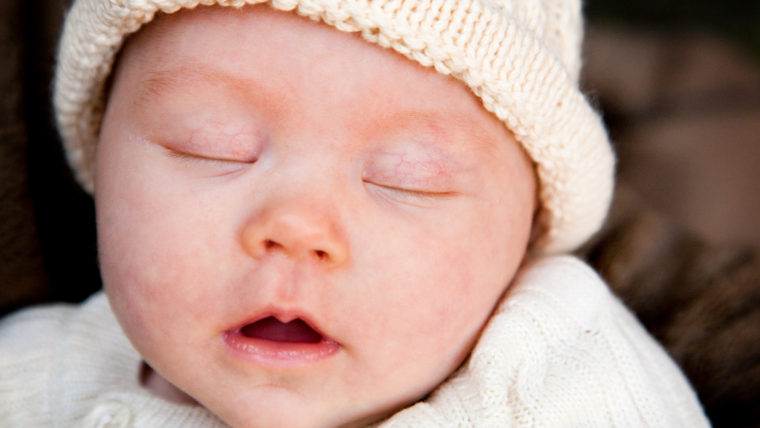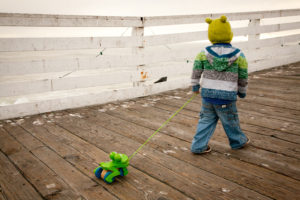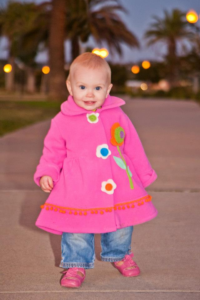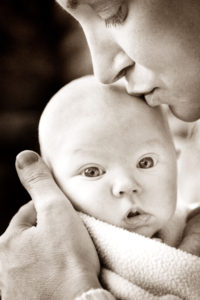
Lately RIE (Resources For Infant Educarers, a parenting philosophy and nonprofit educational organization founded by Magda Gerber in 1978, and pronounced rye) has been getting a lot of hype. It’s being called a Hollywood parenting trend, the latest parenting craze, even lazy parenting. As a parent who practices and loves RIE, all of this has started to really irk me. It’s hard work, this listening to and respecting your child. I take pride in my parenting and now people are calling me lazy? No thank you.
The media seems to be doing its thing again, misconstruing something for the sake of readership or views. It makes me wonder if anyone did any research before they hit the publish button. I haven’t read the newest book or taken a single class. I practice RIE solely based on reading the blogs of experts Janet Lansbury and Lisa Sunbury, so I’m sure Vanity Fair, The Stir, Mommyish, Baby Center and Good Morning America could have quoted them for a little more…balance. They seem to have talked to a few celebrities with varying degrees of knowledge of RIE and come up with a humorous caricature of what it is about. No wonder people are laughing.
RIE isn’t a set of rules or a list of dos and don’ts. It’s another way of looking at babies and toddlers, as actual whole people. Once you begin to see babies as individuals it’s hard not to treat them like the fully formed, capable little people that they are. So here it is; my debunking of the RIE myths and also why I think it’s freaking awesome:
THE HYPE SAYS: RIE is about treating your baby like an adult.
I SAY: Sure, if you only reserve respect for adults, and therefore think everything children do is silly, cute, charming, or ridiculously invalid, then yes, we treat them like adults, in that we actually see them as real people, worthy of respect. Respecting children means meeting them where they are. We observe them while they play, to learn what they are capable of, and we enjoy and accept where they are in the moment, developmentally, emotionally, cognitively and physically. We help them when they need it and back off when they don’t. Children are often much more capable than us agenda driven adults give them credit for. If you just wait and watch, you might be surprised.
For instance, would you assume a 15 month old child couldn’t dress herself? That was my assumption when I watched my daughter rummage through her drawer. My instinct (impulse actually) was to stop her and shut the drawer, (I didn’t want a mess!) but instead, I took a breath and sat back. I watched in amazement as she meticulously went through every article of clothing in her drawer, trying to find one she could pull on. I sat on my hands to avoid helping, and lo and behold, she pulled a skirt up and over her diaper, put her hands in the air and yelled, “DID IT!”
THIS is what I mean by trusting toddlers to be capable. It’s not about treating them like adults, it’s waiting a little, and letting them do what they can do, instead of assuming they need us to do everything for them.
Think: Golden Rule. Treat others the way you wish to be treated, even babies. I’ll give an example. My husband doesn’t like to drive, so I drive, but he DOES like to direct. Sound familiar? Imagine it: I’m trying to focus on driving and he’s saying, “Get over a lane, you might want to turn your blinker on, there’s a car up there, watch out for that guy in the street.” It drives me crazy! So when I am tempted to interfere in my son’s play and tell him not to roll play dough on his face, I stop and remember what it feels like to have a backseat driver. I hold my tongue and let him relax in what he’s doing and make his own mistakes. If I’m lucky, I get the chance to witness that he’s not just making a mess on his face, he’s pretending to shave his beard, just like he saw Dad do this morning.
THE HYPE SAYS: No Toys.
I SAY: Wrong. RIE children have toys. They just don’t NEED lots of toys. No child does really, especially children under the age of two, the stage RIE focuses on. So many parents say, “My child has all these really cool toys and all he wants to do is play with all the boxes.” That’s because everything is new and interesting to a young child. That’s all it’s saying. All those loud, obnoxious toys that light up and move (the ones all parents hate anyway) are just not necessary. (Thank God!) Babies are masters at entertaining themselves, and quite frankly, these toys are usually the first ones to bore them. All that noise and commotion is generally overstimulating for a young brain. RIE does favor open ended toys that can be used in multiple ways limited only by a child’s imagination. Think blocks and balls. So there, your baby can have toys!
THE HYPE SAYS: RIE parents have long adult conversations with babies.
I SAY: Yes, I thoroughly discuss the stock market with my baby each morning as the opening bell rings. No, that’s just silly. I do, however, tell my child before I will pick him up. I say, “Can I pick you up now?” so he has fair warning and isn’t surprised before he is swooped into the air. I’d want the same. I also talk to my baby while changing his diaper or giving a bath. It sounds like this: “OK, I’m going to lay you down on the changing table. I’m going to wipe you now, it’s a bit cold. Oh, I know you don’t like the cold part, we’re almost done. Can you give me the diaper you are holding? OK, now let’s get your pants on.” I wait a little for his response. That’s it. Not so weird is it?! We engage babies in the activity and we tell them what’s going on. “Why? They probably don’t even understand!”, you say. Maybe they do, maybe they don’t, but the point is they know we are telling them “something” rather than doing things “to them”. It also helps tremendously in language development, all this crazy talking to your child. Plus it’s just a good habit to get into for, you know, whenever they do become real people….
THE HYPE SAYS: No highchairs, bouncy seats, sippy cups or baby carriers.
I SAY: RIGHT! RIE advises not using highchairs. This might be the weirdest one of all, but yes, it’s true. Here’s the WHY: if you sit your baby on your lap and feed him with a spoon, he sees it as he would see it if he were feeding himself. This helps him learn the skill more naturally and as a result he does it sooner. So yes, children who are ready for drinks and table food eat at little tables and practice a lot with regular cups with very SMALL amounts of water in them. They drink a little, then they get more. The same goes for food. They get small portions and when they are done they get more. Less mess! Easy peasy. Do I have a highchair? Yup. Do I feel bad about it? Nope, sometimes I just need it. That’s the point. Bouncers, carriers, swings, etc. are for us parents really, so we can “get stuff done” which is fine. RIE just wants you to be aware that this is for you not them.
THE HYPE SAYS: RIE parents don’t help their children, they ignore them.
I SAY: NO! RIE encourages lots of paying attention, playfulness, and most of all, mindfulness. Here’s where that sensitive observation skill and waiting comes in again. Does your child really need help or is he just working through some frustration? Have you ever seen a child learning to crawl? They spend a long time rocking on their hands and knees before they get it. They spend a lot of time falling over, and maybe getting mad as they don’t go in the direction they want, but eventually they get it. Learning is a struggle sometimes, but overcoming struggle is how we gain confidence. What if everyone stepped in each time you were trying to learn something? Would you feel competent? I doubt it. So wait, just watch for those few extra moments, see what happens. Then step in if necessary.
This means not hovering or jumping in if a child isn’t doing something the “right way” also known as “your way.” From learning to walk to building blocks, when I hear a cry for help, I wait a moment and see what happens, and more often than not, my help is no longer needed and I hear, “Never mind Mom, I figured it out!” The message I hope my kids are getting is, “You know what, you are capable, just as you are. I’m here if you need me.” I’m not right there in my kids’ space at every moment to prevent every mistake or fall. To me that sends the message that I think they can’t, and that’s not what I think at all.
THE HYPE SAYS: RIE parents don’t intervene in toddler squabbles.
I SAY: Wrong Again. We don’t let our little ones rule the roost and bully all others involved. No Baby Spartacuses here! Toddlers fight; they take toys; they get in each others space; they do lots of things that we adults might find annoying, from our grown-up perspective.
So where’s the line? RIE encourages letting toddlers work out their minor problems because, AGAIN, they often surprise you and find solutions that work if you just wait. If somebody’s going to get hit or does get hit, that’s not OK. Period. Ideally, you’d try to block the hit and say, “I won’t let you hit. Hitting hurts.” If it happens again, you might say, “You seem to be having a hard time. We are going to go over here and play for a little bit. (Remove toddler to give him some time to regroup.) If it happens again, then he’s telling you it’s probably time to go home. He’s either too tired, too hungry, or too overstimulated to keep playing.
THE HYPE SAYS: No tickling.
I SAY: This one is pretty simple too, but confusing, because kids seem to like tickling and they are obviously laughing. The key to tickling, if you are going to do it, is not to overpower your child, and go slow enough so he has many opportunities to tell you to stop. I’m sure I’m not alone in remembering being tickled to the point of actual pain but not be ing able stop the tickler. It sucks when it goes too far, especially if you’re two.
ing able stop the tickler. It sucks when it goes too far, especially if you’re two.
THE HYPE SAYS: RIE parents don’t praise their children.
I SAY: Yes. This one takes a lot of heat too. What’s wrong with telling your child he did a good job? Let’s examine this. You do something mundane like get a drink out of the fridge. Someone claps and yells “Good girl!”. You’d think they were mental, right? I would. So why do that to a kid? Just say, “Thanks, that was helpful,” and move on. So what about for the big things, like a first step, a first word? What’s wrong with praising a child for that? Nothing is inherently wrong with it, but consider this from an adult point of view. You are working on a big project at work, it’s taken months to complete, and has comprised 80% of your workload. When you are done you have something you think is worthy of Employee of the Year. You present it to your boss. What would you prefer he say? “GOOD JOB! THANKS SO MUCH! You’re a GREAT employee!” Or, “Wow, you really spent a lot of time on this. It’s very thorough. Thank you.” One praises the job; the other praises the effort and validates it. I prefer the second, and so do most children, says RIE. So now you’ve got this glorious moment when your child’s face it lit up with pride, what do you say instead of “Good job!”? Try,“You did it.” A nuance? Perhaps, but it shifts the focus to the child’s efforts, which keeps his intrinsic motivation and thirst for learning intact.
THE HYPE SAYS: No pacifiers for babies.
 I SAY: Sort of. You can use a pacifier if you want. I don’t, simply because I find finger sucking much more convenient. Pacifiers are discouraged because they stop a child from effectively communicating with you. In an effort to just MAKE THE CRYING STOP, you can easily fail to hear what’s really wrong. It is so easy to just pop the pacifier in a baby’s mouth, and enjoy the sweet absence of that grating cry. Pacifiers buy parents time, and some peace and quiet, but they don’t fix the problem. Is he hungry? Is he cold? Wet? Thirsty? Uncomfortable? Maybe he just needs to blow off some steam. Crying is actually a very effective stress reliever; I know I occasionally benefit from a good cry.
I SAY: Sort of. You can use a pacifier if you want. I don’t, simply because I find finger sucking much more convenient. Pacifiers are discouraged because they stop a child from effectively communicating with you. In an effort to just MAKE THE CRYING STOP, you can easily fail to hear what’s really wrong. It is so easy to just pop the pacifier in a baby’s mouth, and enjoy the sweet absence of that grating cry. Pacifiers buy parents time, and some peace and quiet, but they don’t fix the problem. Is he hungry? Is he cold? Wet? Thirsty? Uncomfortable? Maybe he just needs to blow off some steam. Crying is actually a very effective stress reliever; I know I occasionally benefit from a good cry.
THE HYPE SAYS: RIE parents never yell.
I say: Well, who doesn’t have that goal? The truth is, we’re human. We yell, we lose our temper, we get in bad moods and we get overwhelmed. The difference is we offer our toddlers the same grace we would anyone else; we apologize after. “I’m sorry I yelled at you. I shouldn’t have done that.” That’s it. No biggie.
The point is that yelling should not be a tool in your parenting kit. It may work in the moment, but down the line, the shock of yelling will no longer work and the relationship will tarnish. Want some preventative medicine? When a child just begins to annoy you, stop his behavior, don’t let it go on so long that you blow your lid. Early intervention is the key here.
THEY HYPE SAYS: No rocking or nursing babies to sleep.
I SAY: It sounds so nice, right? I’ll rock my baby, sing her a lullaby, and she’ll drift off to sleep. That’s beautiful. Until it happens SEVEN times a night! This suggestion actually falls in line with mainstream parenting advice. (Finally!) Most pediatricians will tell you to put your baby down drowsy but awake so he doesn’t begin to think he needs certain circumstances to fall asleep. By nursing or rocking a baby to sleep, he starts to learn he needs to be nursed or rocked each time he stirs. So why start? “Begin as you wish to continue“, says Magda Gerber. Rock or nurse your baby until he is ALMOST asleep, then set him down so he can drift off to dreamland on his own. Allowing your child to learn how to fall asleep by himself will not only give him an invaluable skill, you will also be able to catch more Z’s. That’s a win-win if I’ve ever heard one!

THEY HYPE SAYS: RIE Parents don’t pick up their babies.
I SAY:…unless they let you know they’re ready. If your baby is playing happily, and you have some things to get done, obviously there’s no need to pick up your child, but if you want to play with him, then do it! Just keep in mind, independent play is a skill, and the more babies practice playing independently, the better they get at it, so if you want a child who can play by himself one day, don’t interrupt him frequently now. Life is short; always make time for holding, playing, cuddling, and singing, but let your baby have a little space every once in a while too.
THE HYPE SAYS: RIE parents don’t do baby talk.
I SAY: TRUE. I feel I covered baby talk in the (Don’t) Treat Them Like Adults section, but it bears mentioning again. Respecting babies means not talking all loud and sing-songy at them. If they seem to like it from time to time, and you can’t help yourself, then go ahead and do it. Just try to remember language is developed by hearing language, not by hearing weird noises.
That’s it; my attempt at debunking the RIE myths. It’s no trend; its been around since Magda Gerber started it in 1978. She built on the work of her mentor, pediatrician Emmi Pikler. RIE gives us parents a little freedom to relax, to trust our babies to know their own timetables, capabilities, and limitations. There are no set “rules”. What you do all depends on the situation, and listening to yourself and your child. Whether or not you choose to use a highchair, for instance, is left up to you and your discretion. That’s the beautiful thing about RIE, this idea of respect. It teaches us to accept our babies, ourselves, and others as well. RIE may be intended for children under two, but it has taught me to respect all people more, not just babies. It’s taught me to enjoy my own life more by slowing down, being present, and waiting for the good stuff. Or in Magda Gerber’s words, I’ve learned to “Do Less. Enjoy More.”
-Kelly Meier

Thank you Kelly! THIS is RIE…contrary to what the other guys are saying.
This is perfect, Kelly. I’ll be sharing for sure to help debunk those ludicrous articles!! Thank you!
Kelly – this is brilliant!
You forgot to mention babywearing
Sam, I figured one post can only handle so much controversy…. 🙂
loved this post, i’ve never heard of RIE but this is how i parent my daughter anyway
Thank you, Kelly!
I’m pretty crunchy and all, but please, look in to the parenting style CTFD. Or calm the __ down. It’s going to be okay, whether this blogger or the next thinks so. This is all exhausting…
Hahahahaha…. I totally agree!
Thank you for putting into words how I feel about RIE. Especially in the face of all the misinformed posts I’ve seen lately.
This is a comprehensive yet succinct summary. An on-the-go article . İ feel much clearer now.
Excellently written, Kelly! You said it, mama! I’m so glad someone finally did!
Shared this on my Facebook!
This is an important rebuttal to the misinformation I’ve seen lately. I read Magda Gerber’s books almost a year ago so this is a great refresher. Your examples are helpful and I especially like the leeway in certain situations.
Practical and helpful. You’ve done an excellent job at countering the negative and false claims on RIE.
Thanks for this! Now how can we get it published in Vanity Fair???
YES!
Wonderful. Thank you for putting into words my feelings about the recent media attention. RIE has so much to offer.
Uh this all sounds like common sense to … uhmmm I didnt realize it was a new parenting philosophy? ? Or am I missing something?
It is uncommonly common sense… and no, it’s not “new”. You’re not missing anything… but many people are…
It is common sense to some people, sadly to many, it is not.
Oh Man! You sound tired! I too subscribe to CTFD parenting! I’m about a chill as you get. That’s what RIE is all about. I’m not crunchy though, but am wondering how that is relevant. Since you brought it up though, I’m bordering on al dente.
Anonymous: Exactly why I wrote it! It IS common sense!
Thank you, Kelly! This is wonderful. There is a lot of misinformation floating around in the press and on the internet right now. It is so refreshing to hear from a parent who practices, understands, and appreciates and benefits from Magda Gerber’s RIE philosophy. You have no idea how much your sharing of the “real story” and real examples, is helpful to other parents who just want to do the best by their kids. This post is worth a hundred press releases which misrepresent the philosophy in the name of “getting hits”, inciting controversy, and selling books.
Thank you Lisa! The encouragement means a lot!
What a great post – thanks!! After seeing some of those other articles which were totally misconstruing RIE I really wanted to right a clarification too, but you did it faster, and way better, than I would have
I often hear people misunderstand RIE to mean ‘treat babies like adults’, but what RIE tells parents is that babies deserve the same respect as adults – it is a very different thing.
Fantastic! Excellent overview of RIE and great to read the truth about it 🙂
Very interesting read! I was a full-time carer to my mother, who has Alzheimer’s Disease, and I recognise a lot of what has been said here. I certainly never wanted to treat her as a child but tried to help her explore what she was still capable of, therefore observation, encouragement, and speaking to her normally, as if she understood everything, were very important. I know what you mean about “hovering”, Mum never liked me watching over her and got quite ratty if I interfered! Having said that, she was also grateful for a bit of timely help if she got stuck with something, and there were often times when I caught her watching me and I knew she was seeing how I did it so that she could copy it.
I wondered at the time if what I was doing with Mum would work with small children, and lo and behold, here’s someone actually doing it! What I did for Mum was pure instinct – she was after all my mother and deserved to be treated with respect and dignity, even though she was so childlike in her needs. Too often we forget that children need this consideration too.
Thank you MarmiteFan (me too I’m English living in Florida ‘Marmite Depreved’!) – I have long thought there is a crossover in the generations with respectful care. I used the same principles when supporting a 90 year old friend in a nursing home, rehabbing my disabled husband and when my children were babies, before i found RIE. I struggled though when my mother had Alzheimers and was disappointed with myself on many occasions. However, my brother turned into a wonderful respectful caregiver in her time of need and I clearly saw how well she cooperated. Kelly’s post is so important! Congratulations on your work with your mum.
Thank you Kelly for giving us who are new to this a better understanding!! I will refer back when I need it!!!
Thank you! This is such a helpful response.
Kelly, thank you for writing this! I loved the comparison of backseat driving to parenting. It’s true – no one likes it; so why should our kids?
Thank you Kelly for writing this post, is so refreshing to read after all the terrible ones in other pages during the last weeks. You really nailed it.
Awesome myth-busting! I laughed out loud at almost every one 🙂 Thanks for the link-love too!
Thanks for this Kelly! This is just what was needed to combat all the negative press RIE was getting.
this segues nicely with Waldorf Education. Meet the child where they’re at, respect them, let them grow, be there, be present so you can help and show the way when they need guidance – all make sense to me! Thanks for posting your debunking essay.
Actually, baby-wearing is excellent for babies – so baby carriers are necessary. Also, the recent research on baby talk suggests that elongating vowels when speaking to babies overwhelmingly helps them have larger vocabularies as toddlers. See the recent report from the University of Washington on the subject. The rest of RIE, I would agree with.
It is possible to bond with baby without carrying on a carrier, when they need to be held we stop what we are doing and hold them, when they are upset we meet their need and acknowledge feelings, when they need sleep we place them to sleep. Of course if on the go is just a matter of preference to use a carrier vs a stroller, it is possible though to parent a baby without depending on a carrier as a method to soothe.
I don’t know what RIE is an acronym for. I do know that this is how I raised and am raising my kids because I don’t have money for all the unnecessary items that parents are told they need at baby showers. I disagree with no pacifiers, though! Some of my kids (I have given birth to 6 healthy babies) didn’t want them, some of them did. They only used them at bedtime to help lull them to sleep. I know they could’ve used their fingers. I also come from a family where mouths were malformed by thumb sucking and pinworms ran prevalent. We didn’t live in a hospital sterile environment and we don’t now. I chose to use a pacifier because they had to make a conscious at some point to not put that thing in their mouth. My 2 year has been weaned from the “suckie” for six months now. We had a conversation and decided that in 3 days we’d give it to Mr. Trashcan. We did! No problems! Not even when she sees other kids with them at parks. She’ll say, “mama, suckie!” Then go on her way. Mentally, I give her a high five. Physically I just nod and smile.
Sam Moore – there’s no mention of baby wearing because it is not a facet of RIE. RIE (Resources for Infant Educarers) does not encourage wearing babies. http://www.janetlansbury.com/2010/03/babywearing-i%E2%80%99d-rather-go-naked-than-wear-baby/
RIE is an acronym for Resources for Infant Educarers started by Magda Gerber. Her books are here:http://www.amazon.com/gp/aw/d/1892560062
http://www.amazon.com/gp/other/aw/d/1118158792?cache=1390589560&pi=SL500_SY115#ref=pd_aw_sims_1&precache=1
As well as this book on RIE for toddlers:
http://www.amazon.com/gp/other/aw/d/0940953250?cache=1390589597&pi=SL500_SY115#ref=pd_aw_sims_3&precache=1
In twenty years time REI children’s employers will really appreciate that they have not been praised for every thing they do like so may in today’s work force who need constant reinforcement.
Thanks for writing this. I will share! One correction: Dr. Emmi Pikler (Magda Gerber’s Mentor) was working with her approach before Bowlby. Dr. Pikler began in the 1920’s and 30s working with families, then founded the Pikler Institute after WWII in Budapest where she applied her approach which was revolutionary in that the children had primary caregivers and were able to form an attachment thus a solid, healthy sense of self! Also they were allowed free, self initiated movement supporting initiative and self confidence.-Thanks again! Liz
I fixed this. Thank you
Great article. THe only part of RIE that I disagree with is the ‘no baby talk’ idea. Babies and young children learn speech by first learning the rhythms and patterns of conversations, the back-and-forth exchange and the shapes of speech utterances. By talking in any way to your baby, including by using nonsense sounds and baby talk, you are helping them learn the structure of conversation; words come later. This means that as long as you are engaging them in back-and-forth exchanges, they are learning language; the words are not so important, at least at first. Personally I speak normally to my baby, sing to her and speak to her using silly sounds and voices, all of which she seems to find fun and engaging.
YES! THANK YOU! All the thoughts I’ve been having lately, in a lovely coherent and eloquent way. Thank you! Hope this travels the globe.
p.s. you don’t have to follow RIE 100% to adopt some of the incredible suggestions of RIE. For example, we use a high chair, but respect our daughter’s wishes to get in or out of it. I think any parenting approach should incorporate what works and doesn’t work for ones family. I think some people steer away from labeled approaches like RIE if it seems too stringent, and I hope more families will adopt RIE and realize that you can tweak it a bit and still benefit so much!
Absolutely! That’s one of the reasons I wrote this to show RIE is flexible and as individual as the parents and children are
Thank you Kelly. So succinct and intelligible and much needed. Magda would be proud!
Kelly, thanks for explaining just how, accessible and stress-free RIE actually is in real life. We all could use a little “do less, enjoy more” in our lives! It’s easier than the media would have us believe.
Never heard of this approach before but now with my third child I practise almost all of these things. I find she is much more resilient & confident than her brother & sister were at this age & very capable too. I am very involved in her life but I won’t hover over her & all
So I just shared this on Facebook. I have shared posts from Janet’s site from time to time but I don’t get much of a response, which is fine. A lot more people read posts than you can tell by “like” or “comments.” I have had A LOT of response to your post, however! I’ve had several people tell me how much sense RIE makes and how that’s kind of what they do to. Several of my Facebook friends who are NOT PARENTS have responded or liked the post. I just wanted to encourage you that you’ve turned the bad publicity into something that resonates with many people (not just parents). Let’s face it, humans are sort of drawn into conflict. I think the fact that RIE had some “bad press” legitimizes it in some ways. I think what really struck a chord with people is the fact that you “admitted” you sometimes use a high chair because it is easier. Honesty is one of the ways RIE is different from other parenting styles. Like I said, just wanted to post some encouragement. I think I will post something similar on Janet’s page because she might need it, too. Thanks so much!
Thank you so much for telling me that. It’s really a great thing to hear!
No idea why that posted anonymously but it me – Kelly- 🙂
I used an Ergo too especially through airports and at the zoo. My son can see from my level above the crowds on my back now so he likes that at 4 even. I recognize it as a tool though 🙂
You just encouraged me to post it on FB 🙂
I agree alot with what this article says. However the high chair business. Well I can barely have time to feed myself and all of my kids far less lap feed my twins. That “suggestion” I will skip. My oldest 12 now was in a high chair. Not only did she start eating solids early on she learned to feed herself very quickly and early on. Every child is different. My twins 13 months sit in high chairs eat fine on their own.
I can certainly understand that! No one is expected to follow what doesn’t work for them. That’s the appeal, boundaries for the parents and the kids! Moms are important too!
Thank you for this clear and thorough essay!
I love RIE and hate all the bad press it’s been getting. RIE and Janet Lansbury really turned things around for me when things got tough raising my son. I love that this article not only addresses the negative ideas about RIE, but also ends up being an excellent summary.
Wonderfully written. Thank you.
Spartacus was not a bully; in fact he fought against bullies. Please correct that reference! (and go rent the movie because it’s fantastic).
Sean, it was a reference to the Vanity Fair article.
Sean are you talking about the Kirk Douglas version or Spartacus: War of the Damned? I will make sure to clarify the correct version in my reference.
Have you researched Baby Led Weaning? It would seem to fit into this philospohy. You need a high chair, but the child is feeding himself rather than you spoon feeding him.
Yes, I know of babyled weaning, but that’s a much longer conversation. I’m not opposed to BLW but I don’t practice feeding my children by any one theory. I used thier cues to determine what and how much to feed them.
These ideas were not new in ’78: They sound a lot like my own parenting theories, which I practiced in the early to mid-’70’s, and which I learned from my mom and grandmother. Just common sense!
Pam Tuggy
Kelly, thank you for writing this! I loved the comparison of backseat driving to parenting. It’s true – no one likes it; so why should our kids?
All sounds fine except the baby talk bit. There is quite a lot of evidence that baby talk, or infant directed speech, is actually beneficial in language development.
Infant directed speech doesn’t have to be incomplete sentences and noises. RIE talks through everything they do “to a baby” so they are doing “with the baby” instead. So instead of goo and gaa-ing to a baby while you change his diaper while he fusses. You would instead say, “now I am going to lift your legs, this wipe will be a bit cold.” often times even babies as young as two months old will engage with basic understanding of this sometimes lifting their own legs or arching their back. This type of language development with attached meaning is preferred in RIE.